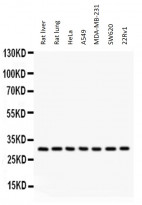ARG40280
anti-NQO1 antibody
anti-NQO1 antibody for Western blot and Human,Rat
Overview
| Product Description | Rabbit Polyclonal antibody recognizes NQO1 |
|---|---|
| Tested Reactivity | Hu, Rat |
| Tested Application | WB |
| Host | Rabbit |
| Clonality | Polyclonal |
| Isotype | IgG |
| Target Name | NQO1 |
| Antigen Species | Human |
| Immunogen | Synthetic peptide corresponding to aa. 242-274 of Human NQO1. (EVQDEEKNKKFGLSVGHHLGKSIPTDNQIKARK) |
| Conjugation | Un-conjugated |
| Alternate Names | DTD; QR1; DHQU; DIA4; NMOR1; NMORI; NAD(P)H dehydrogenase [quinone] 1; EC 1.6.5.2; Azoreductase; DT-diaphorase; DTD; Menadione reductase; NAD(P)H:quinone oxidoreductase 1; Phylloquinone reductase; Quinone reductase 1; QR1 |
Application Instructions
| Application Suggestion |
|
||||
|---|---|---|---|---|---|
| Application Note | * The dilutions indicate recommended starting dilutions and the optimal dilutions or concentrations should be determined by the scientist. | ||||
| Observed Size | ~ 30 kDa |
Properties
| Form | Liquid |
|---|---|
| Purification | Affinity purification with immunogen. |
| Buffer | 0.2% Na2HPO4, 0.9% NaCl, 0.05% Sodium azide and 5% BSA. |
| Preservative | 0.05% Sodium azide |
| Stabilizer | 5% BSA |
| Concentration | 0.5 mg/ml |
| Storage Instruction | For continuous use, store undiluted antibody at 2-8°C for up to a week. For long-term storage, aliquot and store at -20°C or below. Storage in frost free freezers is not recommended. Avoid repeated freeze/thaw cycles. Suggest spin the vial prior to opening. The antibody solution should be gently mixed before use. |
| Note | For laboratory research only, not for drug, diagnostic or other use. |
Bioinformation
| Database Links | |
|---|---|
| Gene Symbol | NQO1 |
| Gene Full Name | NAD(P)H dehydrogenase, quinone 1 |
| Background | This gene is a member of the NAD(P)H dehydrogenase (quinone) family and encodes a cytoplasmic 2-electron reductase. This FAD-binding protein forms homodimers and reduces quinones to hydroquinones. This protein's enzymatic activity prevents the one electron reduction of quinones that results in the production of radical species. Mutations in this gene have been associated with tardive dyskinesia (TD), an increased risk of hematotoxicity after exposure to benzene, and susceptibility to various forms of cancer. Altered expression of this protein has been seen in many tumors and is also associated with Alzheimer's disease (AD). Alternate transcriptional splice variants, encoding different isoforms, have been characterized. [provided by RefSeq, Jul 2008] |
| Function | The enzyme apparently serves as a quinone reductase in connection with conjugation reactions of hydroquinons involved in detoxification pathways as well as in biosynthetic processes such as the vitamin K-dependent gamma-carboxylation of glutamate residues in prothrombin synthesis. [UniProt] |
| Cellular Localization | Cytoplasm. [UniProt] |
| Highlight | Related products: NQO1 antibodies; NQO1 Duos / Panels; Anti-Rabbit IgG secondary antibodies; Related news: Keap1-Nrf2-ARE antibody panel is launched |
| Calculated MW | 31 kDa |
Images (1) Click the Picture to Zoom In






